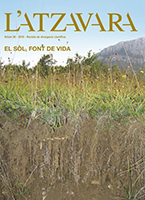Ús i gestió del territori a la mediterrània: implicacions en la matèria orgànica del sòl
Article Sidebar

Main Article Content
Joan Romanyà
Departament de Productes Naturals, Biologia Vegetal i Edafologia, Facultat de Farmàcia,
Universitat de Barcelona
In the Mediterranean basin, soils have been intensively used to supply food, raw materials and energy. Here we aim to interpret the current status of Mediterranean soils by considering their long history of human use. Mediterranean soils are characterized by their poverty of organic matter and frequent carbonate content. Classical studies indicate that carbonates may favor the retention of soil organic matter. As historic soil data is lacking, we have focused on studying the distribution of organic matter across contrasting land uses. We have seen that soil organic matter poverty mainly affects agricultural soils and pastures (mostly shrublands and grassy swards). In contrast, soil organic matter content in forest soils is very rich, especially in the case of carbonatic soils. However, high levels of organic matter in carbonatic soils are not found in arable or pasture soils. Moreover, pastures contain soil organic matter levels very similar to those of arable soils, particularly in carbonatic soils. In Mediterranean lands the lack of soil structure and the presence of carbonates may jeopardize soil aggradation after the cessation of agricultural practices. In this context soil protection strategies should be adapted to Mediterranean ecosystems in order to better withstand climate change.
Article Details
Com citar
Romanyà, Joan. “Ús i gestió del territori a la mediterrània: implicacions en la matèria orgànica del sòl”. Atzavara, L’, vol.VOL 26, pp. 25-34, https://raco.cat/index.php/Atzavara/article/view/307598.